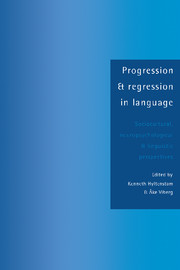 Progression and Regression in Language
Progression and Regression in Language Book contents
- Frontmatter
- Contents
- List of contributors
- Preface
- INTRODUCTION
- THE SOCIOCULTURAL SETTING
- 2 The role of pidgin and creole languages in language progression and regression
- 3 Structure and practice in language shift
- 4 Growing up monolingual in a multilingual community: how language socialization patterns are leading to language shift in Gapun (Papua New Guinea)
- 5 Language change in a creole continuum: decreolization?
- PSYCHO- AND NEUROLINGUISTIC ASPECTS
- THE LINGUISTIC PERSPECTIVE 1: DISCOURSE, GRAMMAR, AND LEXIS
- THE LINGUISTIC PERSPECTIVE 2: PHONOLOGY
- Index
2 - The role of pidgin and creole languages in language progression and regression
Published online by Cambridge University Press: 06 July 2010
- Frontmatter
- Contents
- List of contributors
- Preface
- INTRODUCTION
- THE SOCIOCULTURAL SETTING
- 2 The role of pidgin and creole languages in language progression and regression
- 3 Structure and practice in language shift
- 4 Growing up monolingual in a multilingual community: how language socialization patterns are leading to language shift in Gapun (Papua New Guinea)
- 5 Language change in a creole continuum: decreolization?
- PSYCHO- AND NEUROLINGUISTIC ASPECTS
- THE LINGUISTIC PERSPECTIVE 1: DISCOURSE, GRAMMAR, AND LEXIS
- THE LINGUISTIC PERSPECTIVE 2: PHONOLOGY
- Index
Summary
INTRODUCTION
On surveying the literature on the social role of pidgins and Creoles, one finds surprisingly little information about their place in the decline, progression, and disappearance of other languages. Let me expand upon this:
It is widely acknowledged that pidgins can temporarily push back indigenous languages on plantations where recruits from many different parts of the world have come together. Thus, on the sugar plantations of Queensland, Melanesians from diverse linguistic backgrounds used Kanaka English rather than their first language for a few years. However, on their return home, they resumed speaking their old vernacular. Reinecke (1937: 121) called pidgin development ‘the result of temporary cultural isolation’.
Of course, there are many other documented instances of permanent displacement of populations. The many million Africans who were taken to the plantations of North and South America all ended up speaking a creolized version of the plantation language and losing their home language. Not necessarily in the first generation, but over several generations, this seems an inevitable process. This did not mean, however, that those who were left behind in Africa did not continue speaking their own vernacular. Forced immigration may have weakened some vernaculars, but it did not usually result in their death or replacement. My concern in this paper is a special subclass of pidgins and Creoles, i.e. those that were employed in horizontal communication in established multilingual areas, particularly Melanesia, Australia, and West Africa.
Information
- Type
- Chapter
- Information
- Progression and Regression in LanguageSociocultural, Neuropsychological and Linguistic Perspectives, pp. 39 - 67Publisher: Cambridge University PressPrint publication year: 1994